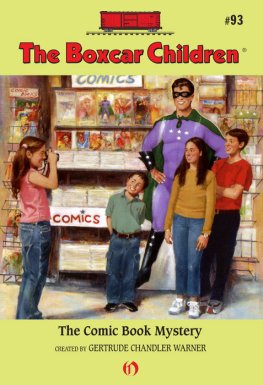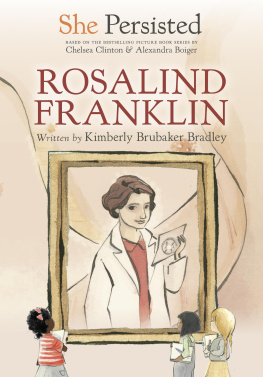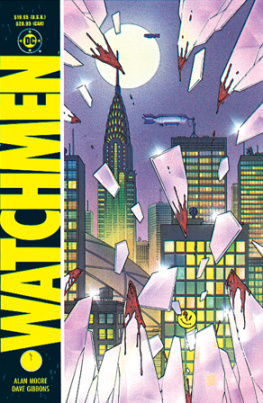ED BRUBAKER: CONVERSATIONS
Conversations with Comic Artists M. Thomas Inge, General Editor
Ed Brubaker: Conversations
Edited by Terrence Wandtke

www.upress.state.ms.us
The University Press of Mississippi is a member of the Association of American University Presses.
Copyright 2016 by University Press of Mississippi
All rights reserved
Manufactured in the United States of America
First printing 2016
Library of Congress Cataloging-in-Publication Data
Brubaker, Ed, author.
[Interviews. Selections]
Ed Brubaker : conversations / Edited by Terrence Wandtke.
pages cm. (Conversations with comic artists)
Collection of interviews originally published in various sources.
Includes index.
ISBN 978-1-4968-0550-8 (cloth : alk. paper) ISBN 978-1-4968-0551-5 (ebook) 1. Brubaker, EdInterviews. 2. CartoonistsUnited StatesInterviews. I. Wandtke, Terrence R., editor. II. Title.
PN6727.B77Z46 2016
741.5973dc23
2015032547
British Library Cataloging-in-Publication Data available
Books by Ed Brubaker
Top Shelf:
(The Complete) Lowlife (Slave Labor, Caliber, Aeon)
Alternative:
At the Seams
Detour
Fantagraphics:
An Accidental Death (Dark Horse)
Vertigo:
Deadenders
Sandman Presents: Deadboy Detectives
Vertigo Visions: Prez, Smells Like Teen
President
DC:
Batman: Bruce Wayne, Murderer
Batman: Gotham Noir
Batman: The Man Who Laughs
Catwoman
Gotham Central
Wildstorm:
The Authority: Revolution
Point Blank
Sleeper
Marvel:
Books of Doom
Captain America
Captain America and Bucky
Daredevil
The Immortal Iron Fist
The Marvels Project
Secret Avengers
Steve Rogers: Super Soldier
X-Men: Deadly Genesis
Winter Soldier
Icon:
Criminal: Vols. 1 & 2
Criminal: The Last of the Innocent
Criminal: The Sinners
Incognito
Image:
The Fade Out
Fatale
Scene of the Crime (Vertigo)
Velvet
This list is in a rough chronological order but in some cases, publishers are the most current (rather than the original listed in parentheses). Subtitles are maintained if the original series contained a subtitle or Brubakers runs on a series are now more familiar with the subtitle.
CONTENTS
Jennifer M. Contino / 2001
Keith Giles / 2001
Tim OShea / 2003
Kuljit Mithra / 2006
Dave Richards / 2006
Mark Rahner / 2006
Duane Swierczynski / 2008
Joshua Cohen / 2009
Chris Mautner / 2009
Kiel Phegley / 2009
Oliver Sava / 2011
Sean Hood / 2012
Kiel Phegley / 2012
Mark Rozeman / 2013
Royal Nonesuch / 2013
INTRODUCTION
I was never one of those people who automatically dismissed genre stuff. I dismissed mysteries because it seemed stupid to read stuff with a solution at the end, like a crossword puzzle, until I actually read some good ones, like Hammett and Chandler. You realize that people can actually do anything within those boundaries.
Ed Brubaker (Groth and Spurgeon 73)
As a prolific and talented comic book creator, Ed Brubaker occupies an interesting position in the contemporary comics scene as a self-described pulp writer, devoted to the conventions of superhero and crime stories. He describes himself as such in a time when contemporary comics are now often distanced from their pulp origins by creators who prefer to connect the medium to more culturally approved art and design traditions. In contrast, Brubakers work on company-owned properties like Batman and Captain America and creator-owned series like Criminal and Fatale lives up to the traditional expectations for superhero and crime stories, respectively. And yet, as Brubaker acknowledges, he likes to extend genre boundaries and experiment with how far he can extend those boundaries before the genres need to be called something else. Moreover, Brubaker layers his stories with a keen self-awareness, using his expansive knowledge of American comic book history to invigorate his work and challenge the dividing line between low and high art. In this way, Brubaker works not only as a popular entertainer but also as a self-conscious artist and a critical theorist. And while he tends not to refer to himself as a theorist or situate himself within any specific theoretical framework, Brubakers work is often described as postmodern by people who may or may not understand the term.
In any case, Brubaker is an artist of intersections and feels comfortable with his position as such. Aside from modernism and postmodernism, some of those intersections to which he blatantly makes reference include the aforementioned pulp and art as well as biography and fiction, independence and incorporation, superhero and crime stories, print and digital formats (for comics), and approval and controversy (from fans, critics, and the general public). With effortless and concurrent references to Milan Kunderas The Art of the Novel, Sal Buscemas Captain America, and (his uncle) John Paxtons Crossfire, he artfully negotiates between the intersections that form the basis for his life as a creator. While some may argue about the originality and genius of the artist, a strict notion of the new has generally been jettisoned in the modern age of comics. In its place is the artist who makes great things because that artist can more fully recognize, choose, revise, and reinterpret influences. Ed Brubaker has that ability to negotiate the complexity of the currents that now feed the contemporary comic scene, currents that include not only comics but other media forms as well. For Brubaker, those currents clearly include comics material such as kid-friendly Archie comics and controversial EC crime comics, classic Marvel superhero comics and revisionist superhero comics such as The Dark Knight and Watchmen; comics criticism ranging from that of the infamous Seduction of the Innocent to the ground-breaking The Comics Journal; film sources including the cult classic Harry in Your Pocket and the self-conscious Kiss Kiss Bang Bang; and fiction inspirations in the seminal crime fiction of Dashiel Hammett and the deconstructive crime fiction of Paul Auster. All of this results in sophisticated work in comics (and more recently, in film) that simultaneously lives up to and works beyond expectations. Brubaker is part of a generation encouraging the common reader of comics to expect a more sophisticated narrative and visual experience; working consistently with illustrators that know him well, Brubakers work has the potential to retrain the reader to think about comics more broadly in terms of cultural context.
For instance, in Lowlife (19911996), Brubaker begins his career with a variation on the autobiographical art comics like
Next page







